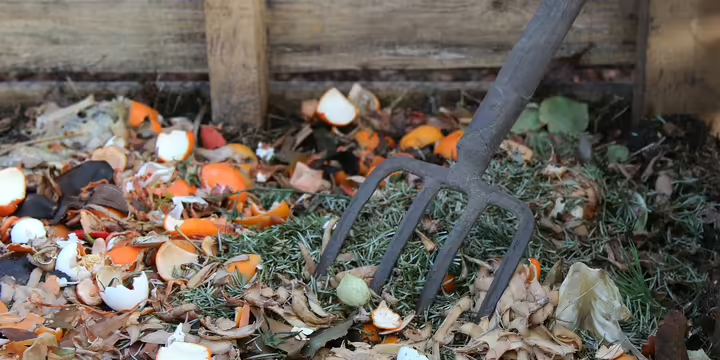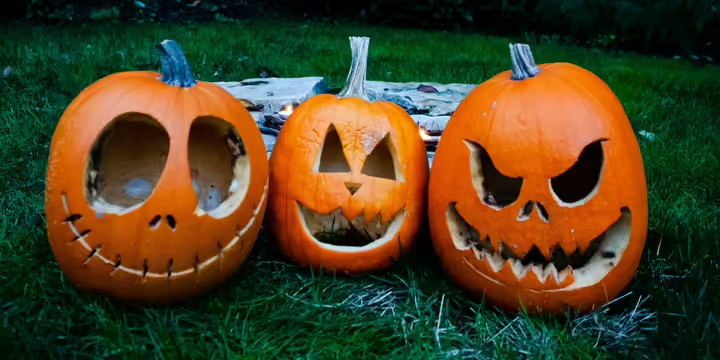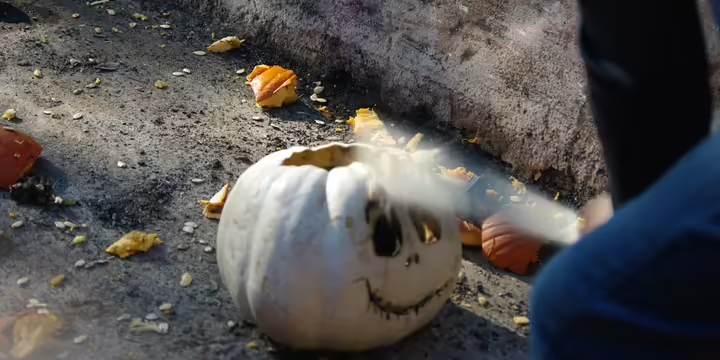Don't trash it, smash it!
Fall is the pumpkin’s time to shine, but what happens when it is time to say goodbye to the short-lived Jack-o-lanterns? Green your Halloween by recycling pumpkins into compost at a free, outdoor Pumpkin Smash offered around Illinois in early November.
Be part of the solution. Everyone can help fight climate change
Pumpkins are an organic waste that produces the potent greenhouse gas methane as they decompose without oxygen in landfills. These decaying pumpkins also leach water that filters through the trash piles and pollutes nearby waterways.
This project is done in collaboration with SCARCE, an Illinois environmental non-profit that started Pumpkin Smashes in 2014. Since their start, the efforts have composted over 1,250 tons of pumpkins, reduced greenhouse gas emissions by over 1,000 tons of carbon dioxide, and diverted over 300,000 gallons of water from landfills. Find a full map of Illinois Pumpkin Smashes on their website at SCARCE.org/Pumpkins.
Visit the links below for the most up-to-date calendar of Extension events in the fall season. Event inclusions will vary depending on location plans, so start with the instructions below.
Pumpkin Smash Instructions
- Find a smash event site near you below or at SCARCE.org/Pumpkins.
- Collect pumpkins from the home, neighborhood, school, or workplace.
- Remove candles, ribbons, paint, and any other non-organic materials.
- Drop off pumpkins at a smash site on the date and time of the specific event. Each site may vary in the methods of smashing or depositing pumpkins available.
- The pumpkins are transported to a composting facility following the event.
Find an Extension smash site near you!
Nov. 1
Cook County
Illinois Extension staff and Master Gardener volunteers will only be providing educational tabling at partnered events hosted in Cook County, listed below.
- First Presbyterian Church of Arlington Heights | 9 AM to 2 PM | 303 N. Dunton, Arlington Heights, IL 60004 | Event Contact: Amanda Anderson, amandaea@illinois.edu, 217-300-9860
- Coyote Run Golf Course | 10 AM to 1 PM | 800 Kedzie Ave., Flossmoor, IL 60422 | Event Contact: Carrie Malfeo, cmalfeo@vopf.com, 708-503-9372
Nov. 8
Cook County
Illinois Extension staff and volunteers will only be providing educational tabling at partnered events hosted in Cook County, listed below.
- Morton Elementary | 9 AM to Noon | 431 N Troy St., Chicago, IL 60612 | Event Contact: Zachary Korth, zmkorth@cps.edu
- LaSalle II Magnet School | 9 AM to Noon | 1148 N. Honore St., Chicago, IL 60622 | Event Contact: Lee Edwards, ledwards2@cps.edu
- Lake View High School | 10 AM to 2 PM | 4015 N. Ashland Ave., Chicago, IL 60613 | Event Contact: Nic Rivera, njrivera11@cps.edu
- Lake Katherine Nature Center | 9 AM to Noon | 7402 W. Lake Katherine Dr., Palos Heights, IL 60463 | Event Contact: Tara Taylor, tara.rosenwinkel@lakekatherine.org, 708-361-1873
Jackson County
- Jackson County Extension Office | 10 AM to 2 PM | Ava RD., Murphysboro, IL 62966 | Event Contact: Lynn Heins, heinsl@illinois.edu, 618-687-1727
Kane County
- Advocate Sherman Hospital (Elgin) | 9 AM to Noon | 1425 N. Randall Road, Elgin, IL 60123 | Event Contact: Jamie Viebach, jviebach@illinois.edu, 630-955-1123
Lee County
- Sauk Valley Community College, Baseball Fields | 10 AM to Noon | 173 IL-2, Dixon, IL 61021 | Event Contacts: Bruce J. Black, brucejb@illinois.edu, 815-632-3611 and Merilyn Kemmerer, kemmerer@illinois.edu, 815-857-3525
Macon County
- Fairview Park | 10 AM to Noon | 2095 W. Eldorado St. Decatur, IL 62522 | Event Contact: Stephanie Hale, smhale@illinois.edu, 217-333-5372
McDonough County
- Veterans Park | 9 AM to Noon | 1800 E University Dr, Macomb, IL 61455 | Event Contact: Christopher Enroth, cenroth@illinois.edu, 309-837-3939
McLean County
- Rader Family Farms, 10 AM to 2 PM | 1312 Ropp Rd., Normal, IL 61761 | Event Contact: Nick Frillman, nfrillma2@illinois.edu, 309-663-8306
Pumpkin Smash FAQS
What's the point of a pumpkin smash?
To fight climate change. Decaying organic matter in landfills produces methane, a potent greenhouse gas that contributes to climate change. The aerobic process of composting does not produce methane.
Help create a circular economy by transforming your “waste” into compost, a valuable product used to produce more food.
What is climate change?
Climate change is a natural or human caused change in weather patterns.
Human activity is currently contributing to climate change by accelerating the greenhouse effect. Learn more about the greenhouse effect and climate change at go.illinois.edu/GreenhouseEffect.
Why can’t I donate my pumpkin to a farm?
There are serious food safety concerns when animal feed is sourced from outside the farm. In fact, Illinois Public Act 48-7 prohibits feeding food scraps to farm animals unless they are sourced from the farm where the animal lives. If you wouldn’t eat a rotting pumpkin, why should a pig?
Learn more about leftovers for livestock from the Harvard Food Law and Policy Clinic.
Why can’t I dump my pumpkin in a field, the woods, or a nature preserve?
- It's illegal and considered littering under the Illinois Litter Control Act.
- Dumped pumpkins and straw bales smother native plant species rather than composting.
- Rotting or decorated pumpkins are not good food sources for wild animals.
- Feeding wild animals can create out-of-control wildlife populations.
Explore more in the blog, Dealing with pumpkins after Halloween: Debunking social media advice
What if I can't attend a Pumpkin Smash event?
Those who cannot attend a smash event may still be able to compost through their local trash provider, private service, or by starting a compost pile. Properly composted pumpkins do not produce methane and contribute to soil health. Learn how to get started composting at extension.illinois.edu/compost.
What is a circular economy and what does compost have to do with it?
A circular economy focuses on systems of production and consumption where nothing is wasted and everything has value. It is an alternative option to the linear economy which extracts finite resources, makes something from them, and then disposes of them.
By recycling food waste into compost, we create a soil amendment that can be used to grow more food.
Where can I find pumpkin recycling and composting educational resources for my event?
Fill out the request to access a variety of Extension's educational posters and infosheets to use at an upcoming pumpkin smash or fall event to take teaching about recycling pumpkins and composting to another level.
Find the fillable form at go.illinois.edu/PumpkinAccess.

Start composting
Compost is decomposed organic material made with material such as leaves, shredded twigs, and kitchen scraps from plants. Compost is a great material for garden soil. Adding compost to clay soils makes them easier to work and plant. Learn how to start composting and how to use this "black gold" in your landscape.

Let's debunk pumpkin social media advice
As the calendar turns from October to November, toothy Jack-o’-lanterns start to look like deflated basketballs. The social spheres start buzzing with alternative uses for a Jack-o’-lantern past its prime, but there seems to be some advice that deserves more attention than a post can afford.

Want to Start a Pumpkin Smash with Extension?
Want to host a Pumpkin Smash through your local Extension office? Use this playbook to organize your own community event to collect pumpkins for composting. This guide covers planning, funding, and hosting for a Pumpkin Smash.